What happens if you go VEGAN and SUGAR FREE for a whole month?
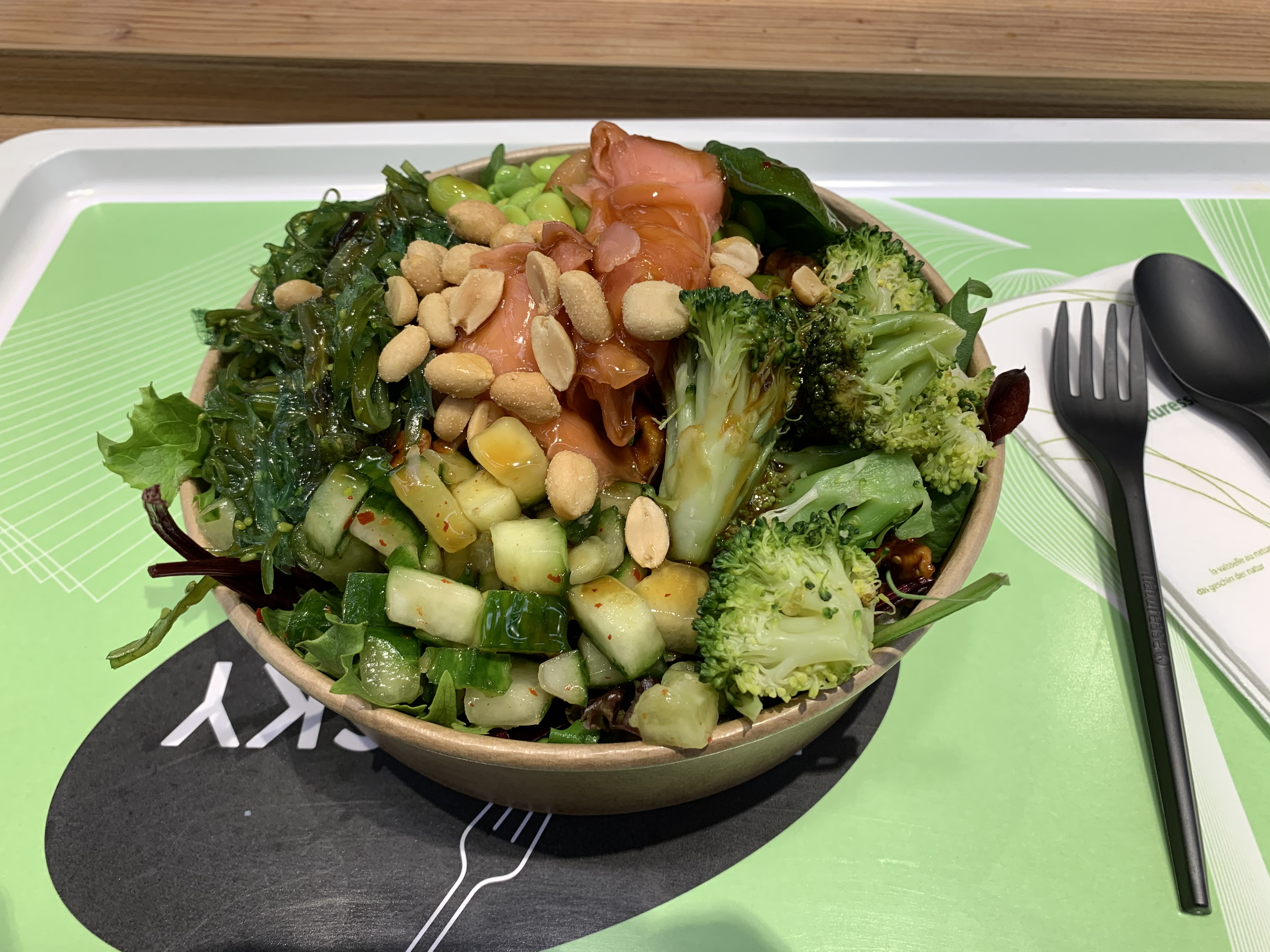
First off, to absolutely no one’s surprise, you’ll lose weight.
So, if that’s your goal, you have the recipe right here.

My goal wasn’t to lose weight, much rather it was about finding out what will happen to my body in general. Losing weight is one outcome. But what else happened? And what is it like every day? What’s the unforeseen challenges? Here’s my experience.
A Third Attempt
Yes, I have tried and failed this month-long project twice before. The vegan month, that is. In 2017 I set the challenge for March and got too frustrated and lazy after just three days, if I remember correctly. I started another attempt in June of 2017 and made it to the 15th, half-way through, having learned a few minor things that helped. I also realized that tiny mistakes are not avoidable.
My first sugar free experiment started in September of 2017 and it was hard to do just the same. After 20 days I called it quits again, already having had used a few cheat days in between.
Changing Habits is Tough!
I’m talking about quitting smoking, taking up running, or just regularly flossing – you know, those healthy things to do. Why is it so hard? Is there something inherently good about habits, regardless their questionable benefit? Is it an evolutionary stable strategy to keep habits? How long will it take to forcefully changes one’s habits? I don’t know, but smart people researched this and found out, it’s somewhere between 21 and 66 consecutive days, apparently.
Why Vegan and Why Sugarfree?
Not only do I find it interesting to experience the consequences for myself when trying new habits or breaking with old ones, but I also would just like to be healthier in order to be able to live a longer and fuller life.
The war on sugar is raging, and more and more world-class athletes are going vegan or have been for years. Eliminating industrial sugars and basing your diet on veggies seems to be good for you, there is consensus about this to be found everywhere.
After I turned vegetarian in 2016 and felt tremendous improvements to my health, energy levels, and athletic abilities, I had the motivation in my pocket to take it to the next level. A more extreme level, that is.
At the same time, I was a bit reluctant because I “feared” I might enjoy the benefits so much so that I won’t be able to stop being vegan and/or sugar free after that trial month. And I knew that would unavoidably get annoying day-to-day and maybe even become a defining characteristic of myself of which I’m not sure I’m comfortable with.
It seems to be seen as a personality trait to live vegan. I find that unfitting. Some people choose to dislike eating olives – but that’s not regarded as a part of their personality, usually. They don’t identify in public as “non-olivers”. In my opinion, being vegan shouldn’t be treated different from that.
And what’s downright annoying is the general hostility that you receive for choosing to eat differently. Especially the elderly have no respect for it and find it hilarious or weird at best to omit eating meat and animal products. The reason for it being deeply rooted in their post-war motivation of just getting enough to eat, no matter what it is. It’s the same for poorer areas and more rural areas. Eating anything apart from meat confuses their inhabitants – there’s just no knowledge about nutrition present. At least that’s what I have experienced.
We’ve Got Enough Food, Now It’s Time to Choose
My research showed that opinions about the best possible type of nutrition vary a lot. But there is some common ground to be found everywhere, and that is eating vegetables is the most important thing and should be maxed out to come as close to 100 percent of our daily diets as possible.
Also, most studies are certain that humanity’s amount of meat consumption is much too high for the planet being able to take the amount of people in the years coming. Creating meat is a highly inefficient way of nurturing humans – most of the energy created gets lost in the animals.
Animal products like milk / dairy products or chicken eggs have played a big nutritional role for humans in the last thousands of years. And while it’s a more efficient way, it’s still a little weird to drink the milk from a different animal meant for its own offspring, if you really think about it. Imagine the first person ever trying to drink a cow’s milk. Ridiculous, right? Or steal and eat other animals’ menstrual products. Anyone must admit this doesn’t seem natural.
Then again, nature is weird. There is no limit to the stuff other species do on this planet in order to get by.
Man is solely dominating nature, sure, but do we really have to rub it in the faces of the other living beings on earth so much?
B12 or not B12
Mankind is not reliant on any of the nutrients in animal products and could live on plants alone. There’s just one exception. Vitamin B12. We can live without it for many years, but after a certain period and constant malnutrition, it will lead to serious damage to the central nervous system.
What a cruel joke!
There were many efforts to find plant-based alternatives rich in B12, because it’s everywhere, just not in sufficient amounts for humans. Soy looked promising, and the process of fermentation helped to increase B12 in several other plants as well. It can be created synthetically, though that’s a bit of a complicated and therefore expensive way.
We need 3 µg of B12 per day but our body can store 2,000 to 5,000 µg of it. That means we’re safe for a few years without getting any of it. But of course, that’s not sustainable.
Red meats and innards are over the top rich in it, but fish and dairy products suffice to do the trick as well. Tough luck for long-term vegans: there’s no choice but to buy products like soy milk with synthetically created B12 added to it, for example. If you care about your central nervous system, that is.
Things I Found Out Early On
- Even a big and progressive city like Hamburg isn’t full of options for vegans. To find lunch at a restaurant, you have to research and be willing cover some distances within the city.
- Buying a snack sandwich during travels is nearly impossible. Everything has butter or cheese at least, it seems.
- Eating produce as close to their original state as possible and cooking at home becomes a lot more important, because you can rely on what’s in it. Reading all the labels requires a lot of time.
- The sugar free aspect of the challenge leads to all the snacks I ate being salty which probably wasn’t great either.
- Indian and general Asian food usually works well, as they are sometimes vegan by accident.
- Vegan products in grocery stores seem very popular and receiving a lot of attention. That’s helpful.
- Beer is vegan and sugar free. There is a God.
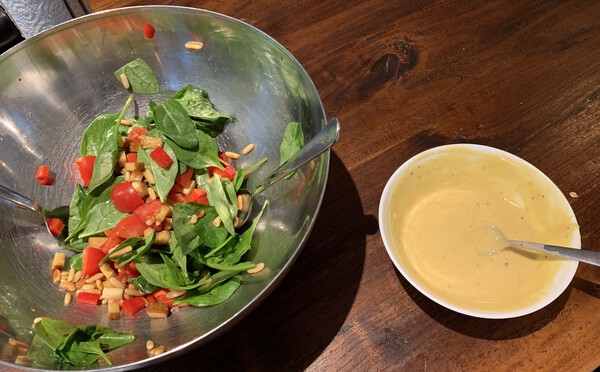
The Rules
A month of a vegan diet is easy to write rules for. No meat, no fish, no animal products whatsoever.
But what about the sugar free part of the experiment? Everything has a bit of sugar in it, hasn’t it? Yes, this one is a lot tougher. So I decided to draw a line at 5 percent of the product. If the product has more sugar than 5 percent, it’s off the table. That’s usually easy to spot because of the nutritional labels.
Sure, many products have a higher count in their natural state. Think of fruits or pure fruit juices. So I decided to except all products which are in their natural state. The main thing I wanted to eliminate were the industrial sugars that are added to every processed food it seems.
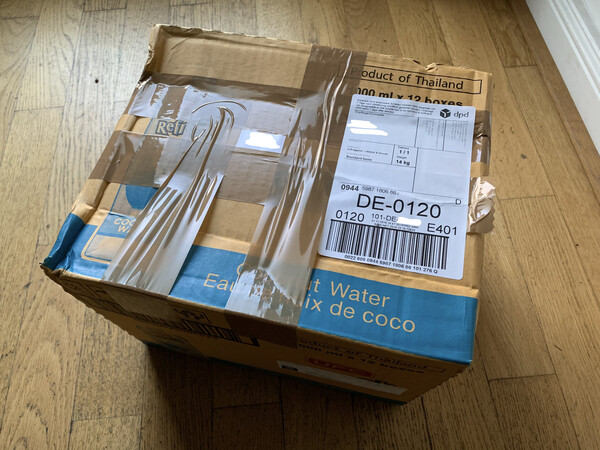
The Tough Situations
I went on a weekend trip to Dresden with two of my kids. We stayed at a hotel that had breakfast included. I really like the convenience of this, every time. But breakfast at a hotel, is that even possible to have vegan, I wondered. Turns out, yes it is.
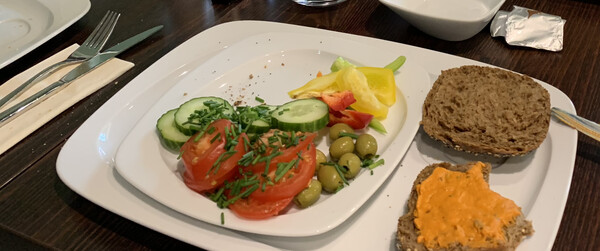
The Huge Cravings
- Some time within the first week my mind spontaneously decided to focus on the deliciousness of cinnamon star sweet cookies, a classic we make every year starting in the depressing November. I didn’t act on it.
- On the 23rd I was craving sweets really bad and it took me quite some internal effort to turn the thoughts towards something else.
- 26th, I felt weak and tired all day. Is that because of the food? But then I downed lots of coconut water which seemed to get me through the down. The following days, the feeling of weakness persisted, though. In addition to some head-aches I rarely have. Is that the diet or something else?
- 28th, my daughter Vera reminded me of the existence and deliciousness of Oreo Milkshakes. She suggested we should make some ourselves at home. Good idea, but not the right time for it, Vera!
- Almost on a daily basis I craved Croissants and Coke, which I both usually have much more rarely.
The Mistakes
- Right on the 3rd of November and the challenge, we hosted a wedding party for a couple we’re close friends with. That meant lots of alcohol, which isn’t forbidden, but also led to me mindlessly downing a small bottle of fritz! kola someone randomly handed me. I only realized afterwards.
- I regularly enjoy soy based yoghurt. After having a 500g bucket of it in one sitting, I wondered what percentage of sugar this vegan product might have. Quite surprised, I read the number 9.
- At a party I had a salad with dressing that tasted a lot like dairy-based yoghurt.
- A package of hot Thai Rice crackers. Vegan, yes, but 12 percent sugar! That made sense when I found out, but the spiciness kind of guarded that fact from my view.
- At an Italian restaurant I was happy to find a Penne Arrabiata dish, which is usually vegan, but this one tasted a lot like it had cheese in it. I chose to ignore that today as I was really hungry and wouldn’t want to be that picky guy in public.
- The only completely conscious mistake was a HoneyPower Bread Energy Bar I ate on the 19th. I couldn’t find anything in the house that would give me the desired energy boost. That bar has honey and 38 percent of sugar in it. That’s a double offender, I’m aware. But it’s also tiny at 50 grams.
That’s a long list of mistakes. I think though, they’re all rather minor. I made it through all big meals staying vegan and nearly sugar free for a month. So I will give myself a pass on this experiment month.
What Changed For Me
First, the sugar downs of the early afternoons were gone. That’s directly related, I’m quite sure. Second, I slept a little better, but that varies a lot and is hard to know exactly. As I’ve said, I lost a bit of weight. That wasn’t intended and isn’t necessary for me, but it happened.
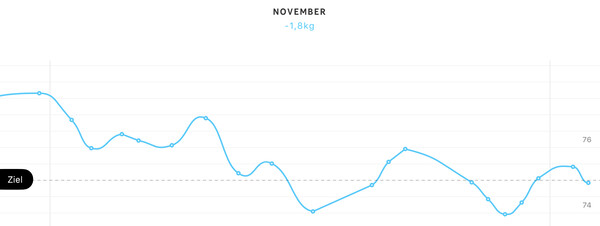
The inconvenience of it all made me very reluctant to say that the benefits outweigh the extra effort needed. After all, the benefits weren’t huge. Also, it’s hard to separate the benefits of the less-sugar-aspect from the vegan advantages. Obviously I knew about that problem before it and this is far from anything remotely resembling science here.
When I cook now, which I still enjoy to do regularly, it’s always vegan. So that has stayed with me after this month. I’m also still very interested and will buy a lot of the vegan products.
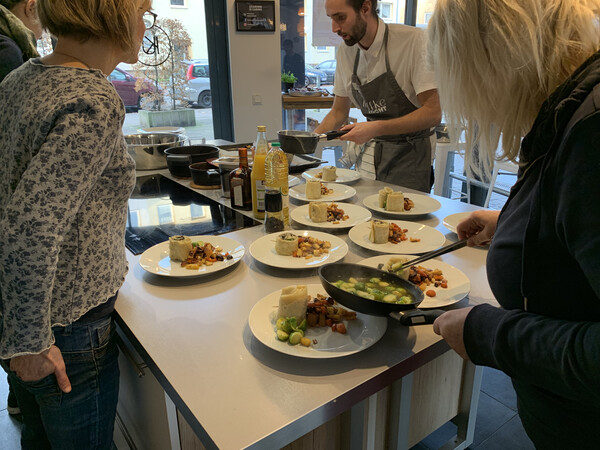
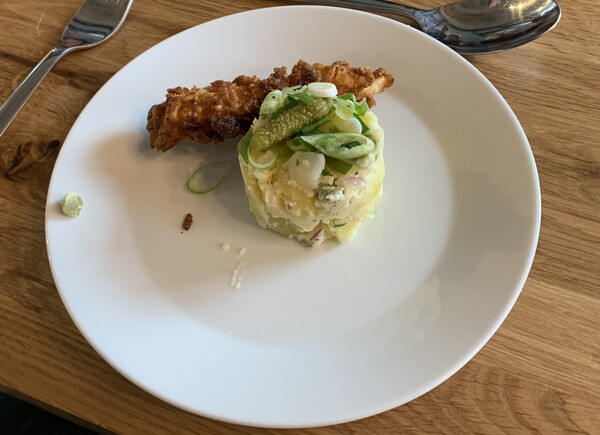
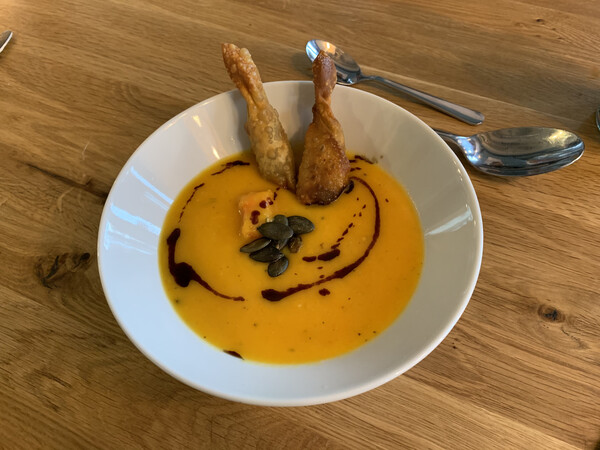
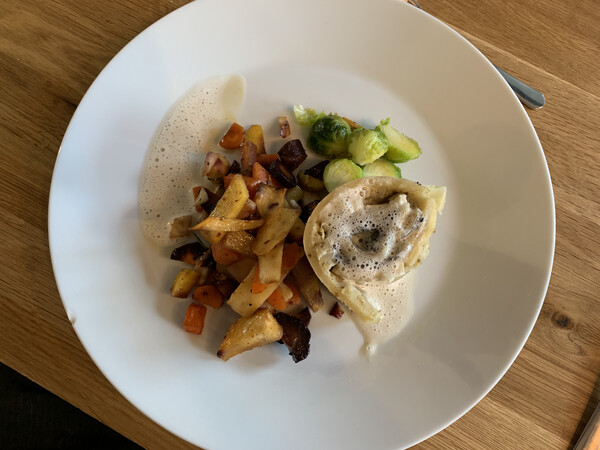
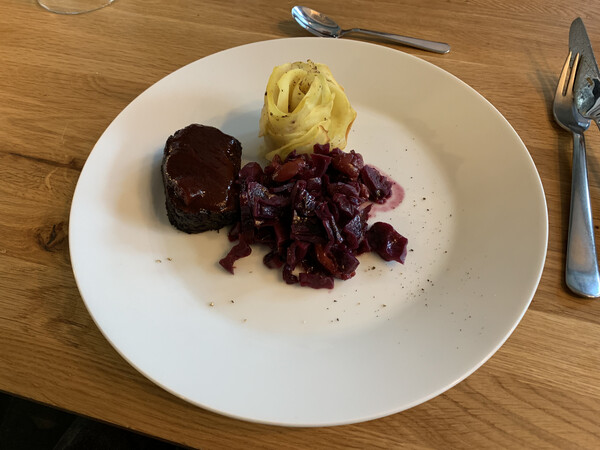
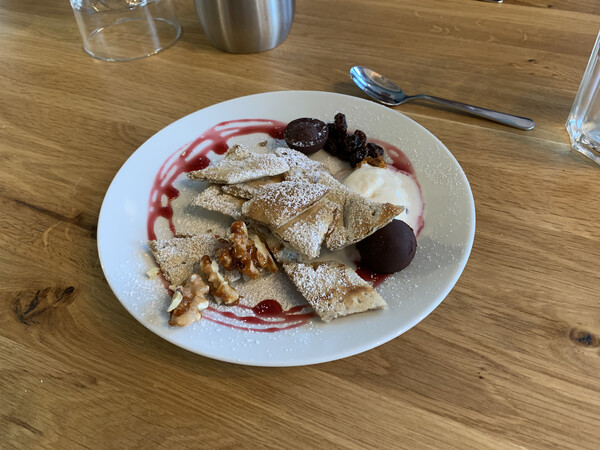
All of the above 100 percent vegan. Looking delicious, right? It all tasted delicious.
The chef told me he’s been vegan for 11 years and has made a bunch of mistakes during that time as well. It’s not avoidable, he said.
The Verdict
I have one data point to compare it to, though. And that is turning vegetarian three years ago. That had a comparatively much bigger impact on my well-being while requiring next to no special efforts in daily life at all.
That makes me say, that right now, I can highly recommend going vegetarian (with the occasional good fish), but the vegan diet seems to not make sense for the general personal benefit. If it’s better for the environment – which it clearly is – is a different aspect.
As for the sugar free part, I also didn’t feel like the missing afternoon lows where such a huge benefit that I would love to quit the deliciously sweet soft drinks and sweets forever. I don’t see that happening anytime soon.
After the Experiment
The first product I enjoyed that broke the rule was a fritz! kola right on December 1st. So good. I just haven’t found another way to imitate the great feeling of a sugary soft drink without the health disadvantages they come with.
You can’t do the perfect thing for your body all the time! But it’s fun to try.
How do you feel after reading this?
This helps me assess the quality of my writing and improve it.
Leave a Comment